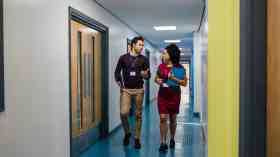
How to approach cleaning during Covid
Cleaning is a fundamental part of keeping schools safe for both staff and pupils during the pandemic. Ciara Lamb from The Key outlines what regular cleaning arrangements you should have in place to minimise the chance of coronavirus spreading in your school, and what to do in the event of a suspected case of COVID-19.
Increasing your regular cleaning schedule
Speak to your cleaning staff to agree additional hours for cleaning. You don't need to deep clean on a regular basis (only when someone has symptoms of, or confirmed COVID-19). However, enhanced regular cleaning is required, and your cleaning staff will need to clean frequently-touched objects between use by different groups (see the section directly below to find out which objects this applies to). They will also need to clean rooms and shared areas more frequently, and between use by different groups.
To make cleaning easier, try to minimise clutter and remove items that are difficult to clean, throughout your school, where you can.
Focus on high-contact and shared areas
Your cleaning staff should use standard cleaning products (such as detergents and bleach) to clean and disinfect frequently touched objects and surfaces, and should wipe these down regularly. These include: door and window handles, banisters, work surfaces (including desks and tables), bathroom facilities (including taps and flush buttons), remote controls, computer equipment (including keyboards and mouse devices), classroom resources such as books and games, furniture, light switches, reception desks, telephones and fingerprint scanners. The same applies to communal kitchens or canteens - speak to your catering staff about whether they're doing this, or whether your cleaning staff need to.
Your cleaning staff should also clean shared areas and resources between every use by different bubbles or groups. This includes outdoor playground equipment, dining halls, classrooms, hard toys (you shouldn't have soft toys in school during coronavirus) and sports, art and science equipment. If it's not possible to clean equipment between groups, store it for 48 hours (or 72 hours for plastics) between uses.
Don't ask your teaching or support staff to clean
Avoid asking non-cleaning staff to do daily cleaning like washing bathrooms, or cleaning desks or floors, unless it's in their job description. If you're concerned you don't have enough cleaning staff to carry out the enhanced regular cleaning outlined above, contact your local authority (LA) for advice.
Cleaning after a suspected case of COVID-19
If you’ve had a suspected case on your premises, you may need to do a deep clean of certain areas. It's unlikely that you'll need to close the school to do this. Your local health protection team will contact you to carry out a risk assessment and advise whether or not a deep clean is necessary.
Check whether your cleaning staff will carry out a deep clean
Cleaning staff may not feel equipped or comfortable to carry out a deep clean, and some unions are advising against it. To check this, speak with your cleaning provider (if you outsource) or your cleaning staff directly (if you keep it in-house).
If your cleaning staff aren't comfortable carrying out the deep clean, speak to your LA to find a suitable specialist cleaning provider.
It can be helpful to provide a checklist for a deep clean to your cleaning staff, or the provider carrying out a deep clean, so you can be confident that everything’s covered. The Key has a free downloadable checklist which is based on Public Health England’s guidance for COVID-19 decontamination in non-healthcare settings that schools are being signposted towards in the DfE’s guidance for full opening of schools.
When carrying out a deep clean
As a minimum, cleaning staff need to wear disposable gloves and aprons – they should wash their hands with soap and water for 20 seconds once they remove these. If there's a higher level of contamination (e.g. the symptomatic individual has slept somewhere on site) or there's visible contamination with body fluids, cleaning staff may need to protect their eyes, nose and mouth. The local health protection team's risk assessment will let you know if this is necessary.
Make sure staff use 1 of the following cleaning products; either a combined detergent/disinfectant solution at a dilution of 1,000 parts per million available chlorine, or a household detergent followed by a disinfectant with the same dilution as above. If they use an alternative disinfectant, check that it’s effective against 'enveloped viruses'.
> Check you can meet the waste disposal requirements
You'll need a safe and secure place (away from children) where you can store waste from suspected cases until the individual's test results are known, and for at least 72 hours if they test positive. If you don't have an appropriate place to store the waste, you'll need to arrange for a collection of 'category B' infectious waste by your local waste collection authority (if they currently collect your waste), or a specialist clinical waste contractor.
Ciara Lamb is a Content Editor at The Key, a provider of up-to-the-minute sector intelligence and resources that empower education leaders with the knowledge to act. The advice in this article was taken from The Key’s resource ‘Coronavirus: how to approach cleaning in your school’, which is based on guidance from the Department for Education, Public Health England and advice from the following unions: Unison, ASCL and NASUWT.
Latest News
18/11/2025 - 09:28
Education Support, the charity dedicated to the mental health and wellbeing of teachers and education staff, has released its ninth Teacher Wellbeing Index.
17/11/2025 - 09:26
Nearly two thirds of Initial Teacher Training providers believe that teachers are not currently prepared to meet the government’s ambition to raise the complexity threshold for SEND pupils entering mainstream schools.
14/11/2025 - 11:04
England’s councils are warning of a "ticking time bomb" in the special educational needs and disabilities (SEND) system, with new data showing deficits that could bankrupt local authorities within three years.
13/11/2025 - 12:14
Event for school leaders, governors and education professionals relocates to the historic Old Billingsgate venue in London.
13/11/2025 - 09:49
The regulations have been set following a second consultation and detailed collaborative working with organisations and people across deaf and hearing communities.







